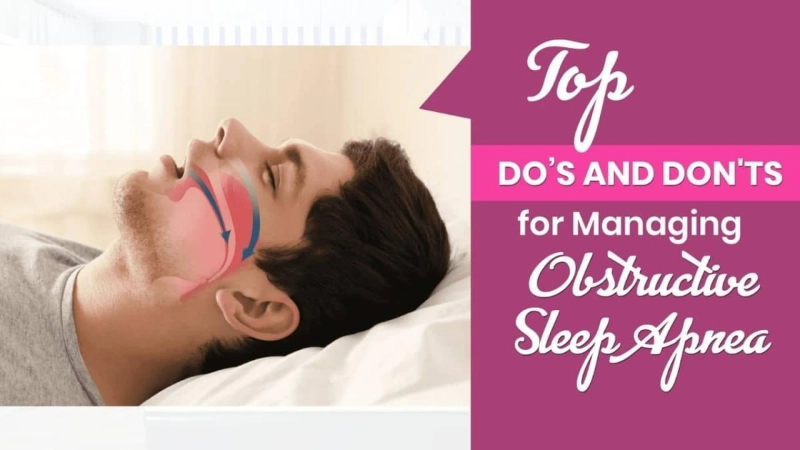Do you snore? Are you tired day after day? Perhaps you have Obstructive Sleep Apnea (OSA). OSA is a sleep disorder that affects breathing.
OSA occurs when the airway collapses during sleep. It is a condition where the muscles in your throat relax and close during sleep, blocking the airway tissue and causing a partial or complete blockage. This type of obstruction repeatedly happens throughout the night, which can severely disrupt or even stop breathing if proper obstructive sleep apnea treatment is not done.
The loud and irregular snoring caused by obstructive sleep apnea (OSA) can make it difficult to fall asleep. This can cause persistent sleep deprivation and develop greater health issues such as heart disease.
If you're suffering from OSA, there are numerous things you should consider to improve your quality of life including sleep apnea snoring treatment. Here are a few key points that you should remember regarding obstructive sleep apnea.
Who is at risk for developing OSA?
Sleep apnea occurs in all age groups, including children, with varying prevalence based on age and sex. The overall prevalence of sleep apnea among adults was estimated at 24% in men and 9% in women. OSA prevalence is higher among males than females for all adult age groups.
There are several factors involved that may increase your risk of developing sleep apnea. These include:
Being MaleOverweightBeing OlderSmokingTaking AlcoholLarge TonsilsLarge TongueSmall Jaw BoneHaving a family history of sleep apneaGastroesophageal refluxAllergies, deviated septum, or other sinus issues can cause nasal blockage.Do's for Managing Obstructive Sleep Apnea
Prioritize your sleep and do whatever it takes to get 7-8 hours of sleep a night. If you're snoring or gasping for air during sleep, make it a priority to seek obstructive sleep apnea treatment.Discuss your risk factors, symptoms, and concerns with your doctor. Consult a specialist if you have problems sleeping due to snoring or gasping for breath. In some cases, over-the-counter remedies may help reduce snoring and improve your sleep quality. If they don't work after several weeks, it's time to see a doctor.Avoid alcohol in the evening, and stick to a glass of water or tea before bedtime.Quit smoking.Don'ts for Managing Obstructive Sleep Apnea
Don't Drink Alcohol Before Bedtime: While it might seem like alcohol could help you fall asleep, it triggers premature awakening and fragmented sleep. This only makes matters worse for people suffering from obstructive sleep apnea.
Don't Smoke: If you smoke, you are two to three times more likely to suffer from obstructive sleep apnea than non-smokers.
Don't Try to Manage Symptoms Alone: Although you may think that a night of restless sleep is one of life's uncomfortable realities. Obstructive sleep apnea symptoms can have long-term health consequences like heart disease and stroke. If you suspect suffering from obstructive sleep apnea, get medical attention immediately.
Don't Delay Treatment: If you have been diagnosed with obstructive sleep apnea, don't wait to seek treatment. Waiting increases the chance of significant medical disorders.
What are the treatment options available for dealing with OSA?
Weight loss and changing sleep positions can benefit some people with OSA.
Positive airway pressure (PAP) is considered the best sleep apnea snoring treatment for moderate or severe OSA or someone intolerant to oral appliances. PAP therapy helps keep the airway open during sleep by gently pushing air into the throat.
A CPAP machine is a device that fits over your nose or mouth while you sleep. The CPAP machine keeps the airway open with a steady flow of air.
Bilevel positive airway pressure (BiPAP), also called BPAP. It is similar to CPAP but has two different settings: one for inhalation and the other one for exhalation.
Oral Appliances. These are worn while sleeping and keep the throat open by moving the jaw forward or holding the tongue in place.
Surgery may involve removing tissue from the upper airway or tightening it, so it doesn't collapse. Implanting a nerve stimulator to strengthen muscles in the upper airway; or, if possible, removing enlarged tonsils or adenoids.
Conclusion
The above information will help you treat and manage obstructive sleep apnea. If you still have worries about managing your OSA, seek an appointment with a specialist. They will provide expert advice and treatment possibilities appropriate to your circumstances.
0


